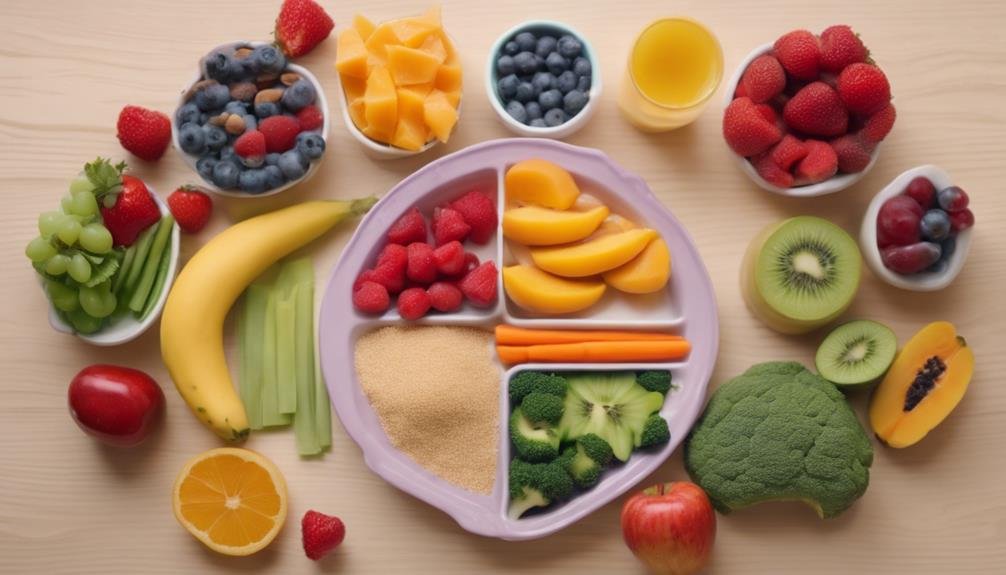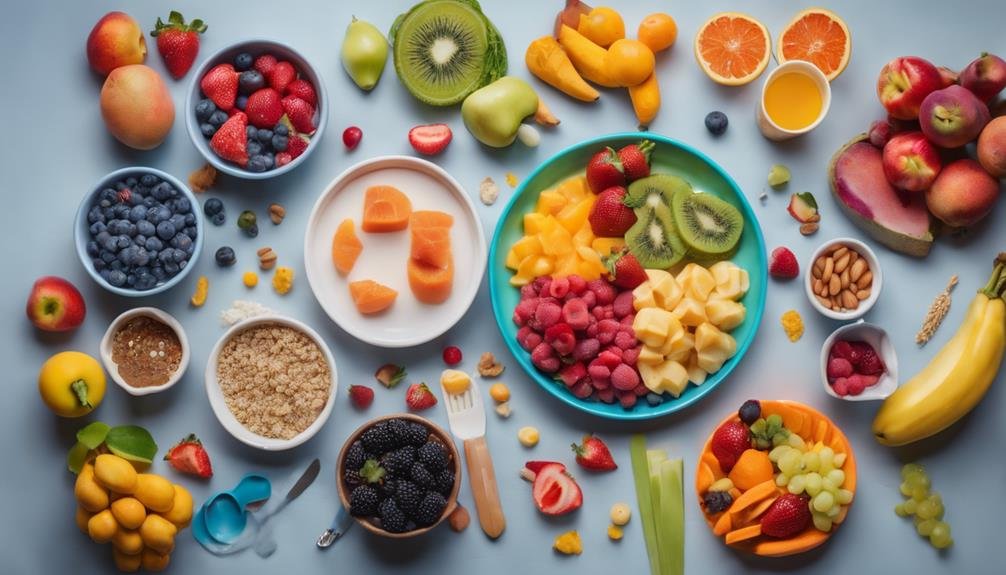"Cherishing Little Steps - A Haven for Baby and Family Journeys"
Understanding Your Toddler's Nutritional Needs: A Detailed Overview
As a parent, you strive to provide the best for your toddler, and understanding their nutritional needs is crucial. By tailoring their diet to meet specific requirements, you can lay a strong foundation for their overall health and well-being. However, navigating the intricate world of toddler nutrition can be daunting. Let's explore the key aspects together to ensure your little one gets the essential nutrients for a thriving start in life.
Key Takeaways
- Toddlers require a balanced diet for growth and development.
- Key nutrients include protein, iron, calcium, omega-3, and vitamin D.
- Variety from all food groups ensures essential vitamins and minerals.
- Portion sizes should be small and meals should be frequent.
- Encourage a diverse range of fruits, vegetables, whole grains, lean proteins, and dairy products.
Toddler's Nutritional Requirements

Understanding the essential nutritional requirements for toddlers is crucial for their healthy growth and development. As a parent, you play a vital role in providing your little one with the right balance of nutrients to support their overall well-being. Toddlers need a variety of foods to meet their energy needs, promote proper growth, and enhance their immune system.
Ensuring your toddler consumes a mix of carbohydrates, proteins, healthy fats, vitamins, and minerals is essential. Carbohydrates from sources like whole grains, fruits, and vegetables provide the energy needed for your child's active lifestyle. Proteins, found in foods like lean meats, poultry, fish, eggs, and legumes, are crucial for muscle development and overall growth.
Additionally, healthy fats, such as those from avocado, nuts, and seeds, are important for brain development. Introducing a wide range of fruits and vegetables into your toddler's diet will ensure they receive essential vitamins and minerals necessary for their immune system and overall health. By understanding and meeting these nutritional requirements, you're setting the foundation for your toddler's lifelong health.
Key Nutrients for Growing Toddlers
To support your growing toddler's development, ensuring they receive key nutrients is essential for their overall health and well-being. Toddlers have high energy and nutrient needs due to their rapid growth and development. Key nutrients for growing toddlers include:
- Protein: Important for growth, tissue repair, and immune function. Good sources include meat, poultry, fish, eggs, dairy, legumes, and tofu.
- Iron: Essential for healthy blood and brain development. Offer iron-rich foods like lean meats, poultry, fish, beans, and fortified cereals.
- Calcium: Crucial for strong bones and teeth. Dairy products, fortified plant-based milks, tofu, and leafy green vegetables are excellent sources.
- Omega-3 Fatty Acids: Support brain development and vision. Include sources like fatty fish (salmon, mackerel), flaxseeds, and walnuts in their diet.
- Vitamin D: Aids in calcium absorption and bone health. Sunlight exposure, fortified dairy products, and supplements can help meet their needs.
Ensuring your toddler gets these key nutrients will support their growth and overall health during this crucial stage of development.
Balanced Diet for Toddlers

For your growing toddler, maintaining a balanced diet is crucial to ensure they receive all the necessary nutrients for optimal development and health. A balanced diet for toddlers should include a variety of foods from different food groups to ensure they get a wide range of essential nutrients. Foods rich in vitamins, minerals, protein, carbohydrates, and healthy fats are key components of a balanced diet.
Encouraging your toddler to eat a variety of fruits and vegetables, whole grains, lean proteins, and dairy products will help provide the necessary nutrients for their growth and development. It's essential to offer a balanced mix of foods to support their energy levels, brain development, and overall health.
Remember to limit sugary snacks, processed foods, and excessive amounts of unhealthy fats to maintain a balanced diet. By focusing on whole, nutrient-dense foods, you can help your toddler establish healthy eating habits that will benefit them now and in the future. Your active involvement in their meal planning and preparation plays a crucial role in shaping their dietary choices and promoting a healthy relationship with food.
Food Groups for Optimal Nutrition
Shifting the focus to the optimal nutrition your toddler needs, let's explore the importance of incorporating varied food groups to meet their growing needs and support their overall health and development. To provide your little one with essential nutrients, it's crucial to include foods from all the major food groups.
Start by offering a variety of fruits and vegetables to ensure a good intake of vitamins, minerals, and fiber. These colorful foods not only support your toddler's immune system but also aid in digestion and overall well-being. Incorporating whole grains such as whole wheat bread, oats, and brown rice provides energy and important nutrients like B vitamins and fiber.
Don't forget about protein-rich foods like lean meats, poultry, fish, eggs, beans, and nuts. Protein is vital for your toddler's growth and muscle development. Dairy products like milk, cheese, and yogurt are excellent sources of calcium, essential for strong bones and teeth. By including foods from all these groups in your toddler's diet, you can ensure they're getting the balanced nutrition they need to thrive.
Portion Sizes and Meal Planning

Understanding appropriate portion sizes and effective meal planning is crucial for ensuring your toddler receives the right balance of nutrients for their growth and development. Toddlers have small stomachs, so it's essential to offer them small, frequent meals throughout the day. A good rule of thumb is to provide about a quarter of an adult serving size per meal. For example, a tablespoon of vegetables or a small slice of fruit is suitable for their tiny tummies.
When planning your toddler's meals, aim for variety. Include foods from all food groups to ensure they get a broad spectrum of vitamins and minerals. Incorporating colorful fruits and vegetables, whole grains, lean proteins, and healthy fats into their diet is key. Remember to offer water as the main drink and limit sugary beverages.
Mealtime should be a relaxed and enjoyable experience for your toddler. Sit together during meals, and try to maintain a calm atmosphere. Encouraging them to try new foods without pressure is important for developing their palate. By paying attention to portion sizes and meal planning, you can help your toddler establish healthy eating habits for life.
Common Nutritional Challenges
To ensure your toddler's optimal growth and development, it's important to address common nutritional challenges they may encounter. Toddlers can be picky eaters, making it challenging to ensure they receive all the necessary nutrients for their growth. Encouraging a variety of foods can help tackle this issue. Another common challenge is dealing with food allergies or intolerances. It's crucial to identify any allergies early on and adjust their diet accordingly to prevent any adverse reactions.
| Common Nutritional Challenges | Tips to Address |
|---|---|
| Picky Eating | Offer a variety of foods and involve your toddler in meal preparation. |
| Food Allergies | Keep a food diary to track potential triggers and consult a pediatrician for guidance. |
| Iron Deficiency | Include iron-rich foods like lean meats, beans, and fortified cereals in their diet. |
| Vitamin D Insufficiency | Allow for some sun exposure and offer foods rich in vitamin D like fortified milk and fatty fish. |
Frequently Asked Questions
How Can I Encourage My Picky Eater to Try New Foods?
Trying new foods can be tough for picky eaters, but you can make it fun! Offer small portions of new foods alongside familiar favorites. Encourage tasting without pressure. Praise any effort, no matter how small.
Are Organic Foods Better for My Toddler's Health?
You may wonder if organic foods truly benefit your toddler's health. While they can be pricier, they often have fewer pesticides and synthetic additives, potentially offering a purer option for your little one's nutrition needs.
Can Toddlers Get Enough Protein Without Eating Meat?
You can ensure your toddler gets enough protein without meat by offering plant-based sources like beans, lentils, tofu, and quinoa. Dairy products, eggs, and fortified foods also provide protein. Variety is key for a balanced diet.
What Are Some Healthy Snack Options for Toddlers?
When choosing snacks for your toddler, aim for a variety of options like fresh fruit slices, yogurt with granola, or veggie sticks with hummus. Keep it colorful and fun to entice their taste buds!
Should I Be Concerned About My Toddler's Sugar Intake?
You should definitely be concerned about your toddler's sugar intake. High sugar consumption can lead to various health issues like tooth decay, obesity, and even affect their behavior. Opt for healthier snack options to reduce sugar intake.
Conclusion
You've learned about your toddler's nutritional needs and how to provide them with a balanced diet for optimal growth and development. Are you ready to take on the challenge of creating nutritious meals that will support their health and well-being?
Remember, a variety of foods and appropriate portion sizes are key to establishing healthy eating habits for your little one. Keep up the great work in nourishing your toddler's body and mind!



Thank you for the auspicious writeup It in fact was a amusement account it Look advanced to more added agreeable from you By the way how could we communicate
Добрый день всем!
Получите документы об образовании всех ВУЗов России с гарантированной подлинностью и доставкой по РФ без предварительной оплаты!
http://russa24-attestats.com/
The Basic Principles Of buy injectable steroids. https://directoryfrenzy.com/listings12651493/little-known-facts-about-buy-injectable-steroids
купить диплом в магнитогорске diplomvash.ru .
Hi to every body, it’s my first visit of this blog; this website includes remarkable and in fact fine information designed for readers.
yaoisennari.ekafe.ru/viewtopic.php?f=169&t=1669&start=0&view=print
http://www.sabalsuppliers.com.np/product/view/6-zone-fire-alarm-panel
viglojdrc.org/fr/news/les-jeunes-transformes-pour-transformer-et-membres-du-cjadh
visacart.80lvl.ru/viewtopic.php?f=1&t=665&start=0&view=print
euroreparmuldersteendam.nl/service-en-onderhoud/